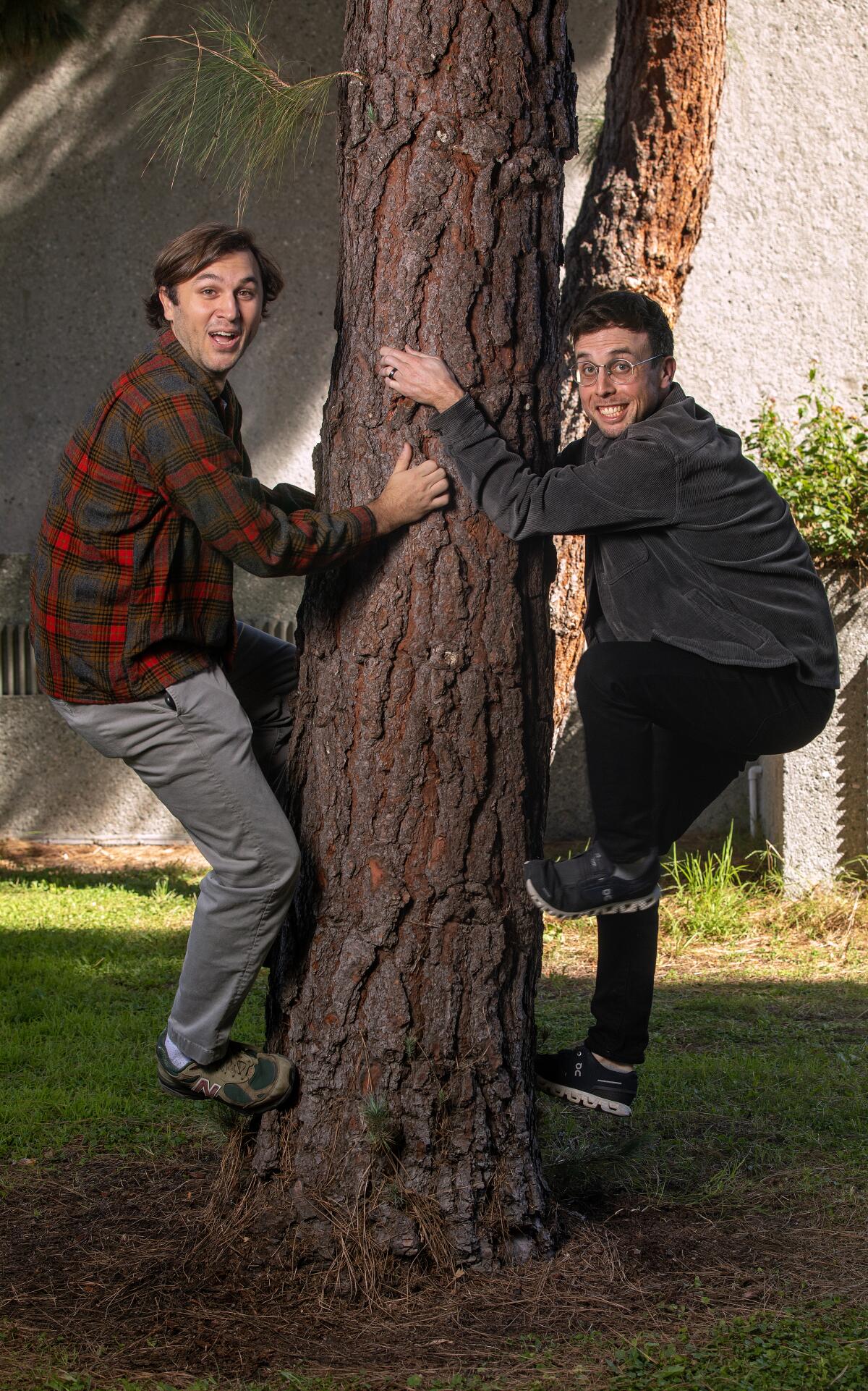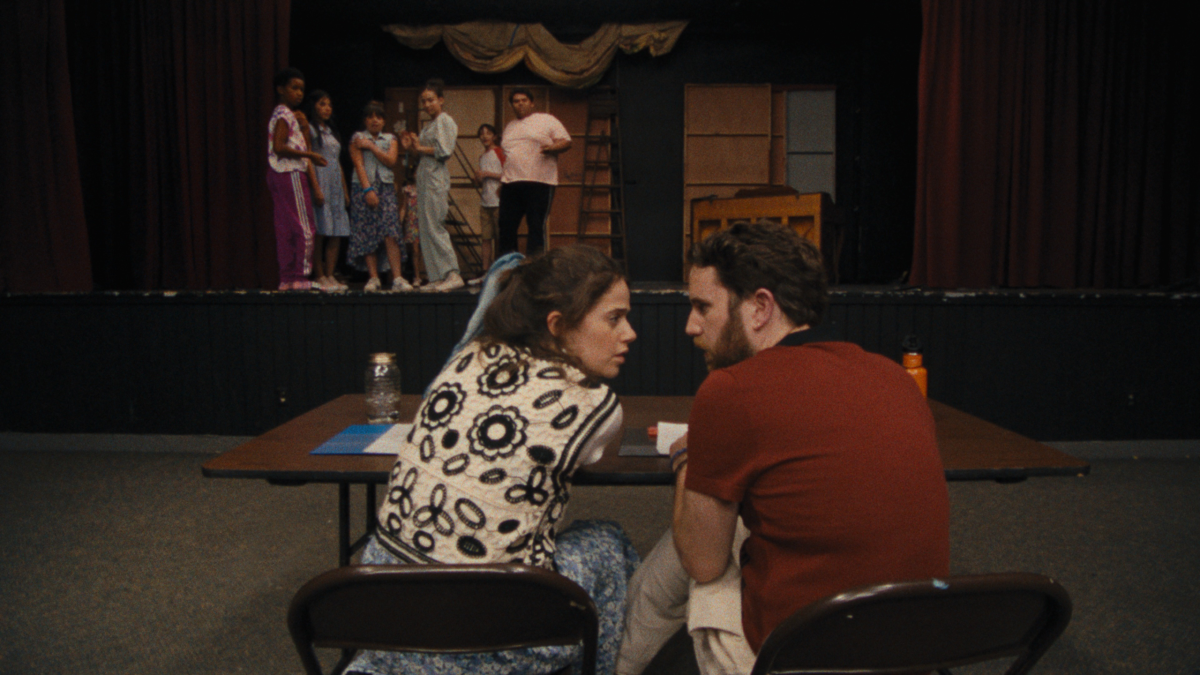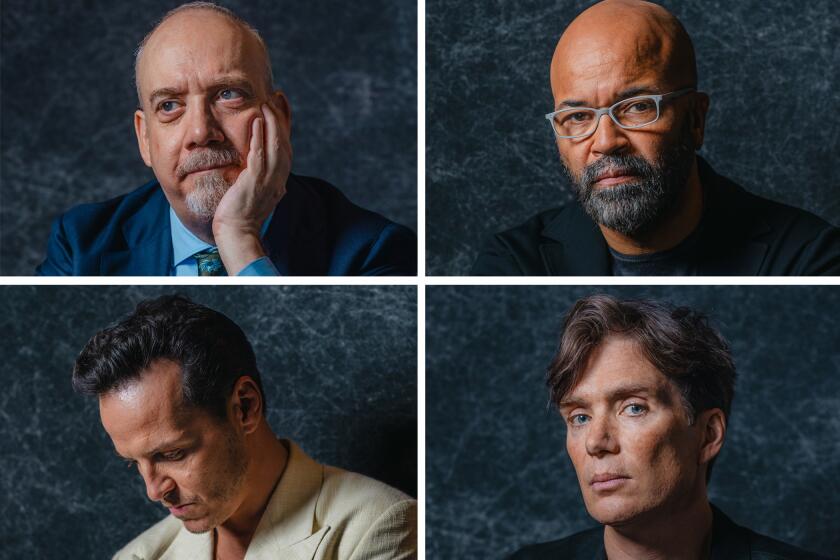Is “Camp Isn’t Home” one of the year’s best movie songs? Is it, kind of? Kind of, it is

- Share via
There are three bits of alchemy in “Camp Isn’t Home,” one of the most memorable movie songs this year. But to appreciate the treasure it becomes, you have to understand the dross from which it came.
The largely improvised comedy feature “Theater Camp” sprang from a short by the same name, a loving paean to the finding of community in theater that bonded co-writer and co-director Nick Lieberman, co-writer, co-director and co-star Molly Gordon and co-writers and co-stars Noah Galvin and Ben Platt in real life. They proudly bear the “theater nerd” label — even “musical theater nerd” and, just in case we missed the depth and breadth of the nerdiness, “musical-theater history nerd.”
“We went to theater camp; the four of us met doing theater as kids,” Lieberman tells The Envelope via Zoom with co-composer Mark Sonnenblick. “For all the craziness and the not-sleeping and the maybe-inappropriate acting exercises and everything, those are still my most meaningful childhood experiences and where we got so much of our community.”
In “Theater Camp,” Gordon and Platt play longtime creative partners Rebecca-Diane and Amos, stressing out over Rebecca-Diane’s lateness in crafting the big finale number for the campers’ annual original musical. Confronted by Amos to perform the song she claims she has written before the kids (and with Amos’ hostile arming of her with an autoharp), Rebecca-Diane improvises gobbledygook based on whatever she sees.
Our BuzzMeter film experts are back to predict what Oscar voters will nominate in 10 Academy Awards categories. Vote in the online polls!
“Girl with an open Snapple / a boy who’s looking down / and we all come here for summertime / camp ... isn’t home / but isn’t it? / in a way / it kind of is / oh, it kind of ... is.”
“Molly is just a brilliant fountain of absurd lines and observations,” says Lieberman, explaining that, while she ad-libbed much of the scene during writing sessions, “a lot of the most absurd details in the lyrics came from Molly improvising on camera in that moment.”
Sonnenblick adds, “We were like, can we say ‘kind of’ again? Is there a way to get it three times in the beginning of the chorus and have it somehow sound like a song? Because then that’ll be amazing.”
This is a comedy with a happy ending, so when the kids present the finale song to a packed house of family and friends, it’s real. And it’s spectacular.
The first bit of alchemy is Rebecca-Diane’s random observations coming from the mouths of the campers. So as one kid after another names themselves, they each become that “boy looking down.” It becomes internal and invested, rather than an external observation.
“When we hit that moment of ‘A girl with an open Snapple’ and it’s like the spotlight ‘Rent’ anthem vibe, we immediately know what’s going on and you can feel it grow,” Sonnenblick says, “How could the kids perform this in the moment and have it feel really sweet and beautiful?”
The pre-chorus answers that question, springing from one of Gordon’s improvs that didn’t make it into the film, when she desperately sang, “We all fly — to find our home!” That bit of Rebecca-Diane’s wild-eyed scrambling didn’t make the final cut, but in the finished song, “We all fly” wings in on a soaring harmony. It’s the first hint of real inspired songcraft that Rebecca-Diane has applied, which the kids breathe into life: “We all fly / to find a place where we belong.”
Sonnenblick says Platt jumped on the notion of making a harmony of that line during the writing session and it took off, leaving the novelty-parody behind: “To discover these things in the room and we don’t have to get director approval because the directors are right there ... We found the exact harmonies later, but that came from Molly shooting something out there that we tried to make into something beautiful.”

Then the gold is fully struck in the chorus, which takes her stumbling words and sets them to a delicately beautiful melody at first sung by just one camper. Madisen Lora’s unsure, but lovely, vocal gives the impression of a lost kid finding her way — to the community and “home” of theater.
“We were all working on it in that room together: ‘Is it really going to be this rambly and this wordy?’ But there was a special feeling to it,” says Lieberman. “We couldn’t stop singing it.”
Eventually, the entire cast is singing those words, making them no longer insecure, but a proud declaration of the imperfection of their union. “Camp isn’t home ... I think it kind of is.”
“When she’s making it up, the ‘kind of’ is her doubting her statement, ‘Camp isn’t home’: ‘Wait, is that right?,” says Sonnenblick. “Then when they sing it later, it’s actually an emotional thing: ‘I have such affection for this place that isn’t home ... but maybe it is.’ It’s a place where I belong.”
Or, as Lieberman says of his own youthful days in theater camp with his eventual collaborators: “Whatever it was, we loved it.”
More to Read
From the Oscars to the Emmys.
Get the Envelope newsletter for exclusive awards season coverage, behind-the-scenes stories from the Envelope podcast and columnist Glenn Whipp’s must-read analysis.
You may occasionally receive promotional content from the Los Angeles Times.













